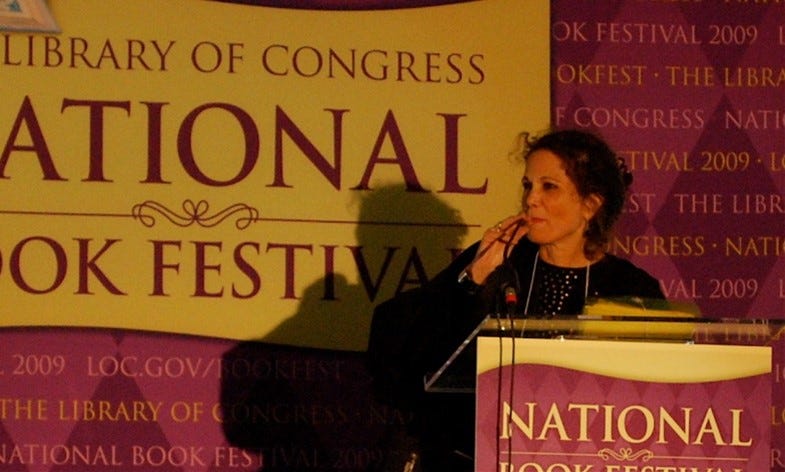Moving Forward Together: Day 27
March 27: Julia Alvarez & the Crone’s Story of Survival and Voice
Photo credit: By Valerie Hinojosa - https://www.flickr.com/photos/valkyrieh116/3967875650, CC BY-SA 2.0, https://commons.wikimedia.org/w/index.php?curid=33741072
Some stories cross oceans. Some carry generations. Some hold the weight of identity, exile, resistance, and belonging—and no one captures those stories quite like Julia Alvarez, born March 27, 1950.
A Dominican-American poet, novelist, and essayist, Alvarez has spent her life telling stories that weave together the personal and the political, the past and the present, the immigrant and the ancestral. Her work is an offering to those of us who know what it means to belong in two places, to carry two languages, to hold joy and loss in the same breath.
Alvarez was born in New York City, but raised in the Dominican Republic until her family was forced to flee Trujillo’s dictatorship when she was 10 years old. That displacement, that fracture, lives in her stories. Her characters often move between cultures, between languages, between what was and what is becoming.
Her novels are deeply feminist, boldly political, and achingly personal.
📚 How the García Girls Lost Their Accents (1991) – A semi-autobiographical novel about four sisters navigating life between the Dominican Republic and the United States, grappling with cultural identity, assimilation, and memory. Told in reverse chronological order, it unravels the journey of becoming—and unbecoming—immigrant women.
📚 In the Time of the Butterflies (1994) – A haunting, powerful fictionalized account of the Mirabal sisters, known as “Las Mariposas,” who fought against Rafael Trujillo’s dictatorship and were assassinated for their resistance. The novel blends historical fact with narrative intimacy, celebrating women’s courage and the cost of dissent.
Her other works—poetry, children’s books, memoir, essays—all continue this legacy: stories of women, of exile, of voice, of survival.
The Crone knows that memory is resistance. That keeping the stories of our mothers and grandmothers alive is an act of magic, of survival, of protest.
Alvarez’s work reminds us that:
Telling our stories is a sacred act.
Our heritage is not baggage—it is a source of strength.
The voices of women—especially women of color, of diaspora, of resistance—must not be silenced.
To be a Crone in this context is to be the keeper of language and memory, the one who refuses to let the past be forgotten or the present be simplified. She speaks for the in-between, for the bridges, for those whose truths don’t fit easily into borders or boxes.
A Spell for Telling Our Stories & Honoring Ancestral Voices
This spell is for those who feel caught between cultures, who are trying to find their voice or honor where they come from. Inspired by Julia Alvarez’s storytelling, it helps you channel the wisdom of your ancestors, claim your space, and write yourself into the world.
What You’ll Need:
A brown or gold candle (for earth, ancestry, and voice)
A journal or piece of paper
A small item from your heritage (a photo, a word in another language, a family recipe, a piece of cloth)
A stone or shell (to ground your truth)
The Ritual:
1. Light the Candle of Inheritance
Light the brown or gold candle, saying:
"I come from stories.
I come from survival.
I carry the voices of those who came before."
2. Call in the Ancestors
Hold the item from your heritage and whisper:
"Speak through me.
Let your names rise in my memory.
Let your truths find breath in my voice."
3. Write Your Story’s Opening Line
Take your journal or paper and write the first sentence of your story. It can be fiction or memory. Just begin. A truth. A place. A name.
Then say:
"This is the story I am writing.
This is the space I claim.
I am not lost between—
I am the bridge, the poem, the truth."
4. Ground & Keep the Spell
Place the stone or shell on your paper and let the candle burn a bit longer. When ready, snuff it out. Keep the stone and your written line as a seed of voice, identity, and power. Return to it. Build from it. Tell your story.
Julia Alvarez teaches us that the act of writing is an act of reclamation. That when women of diaspora, of resistance, of split identities tell our stories, we do not just heal ourselves—we change the world.
We move forward together—rooted in history, fueled by resistance, and weaving the future with our own hands.




